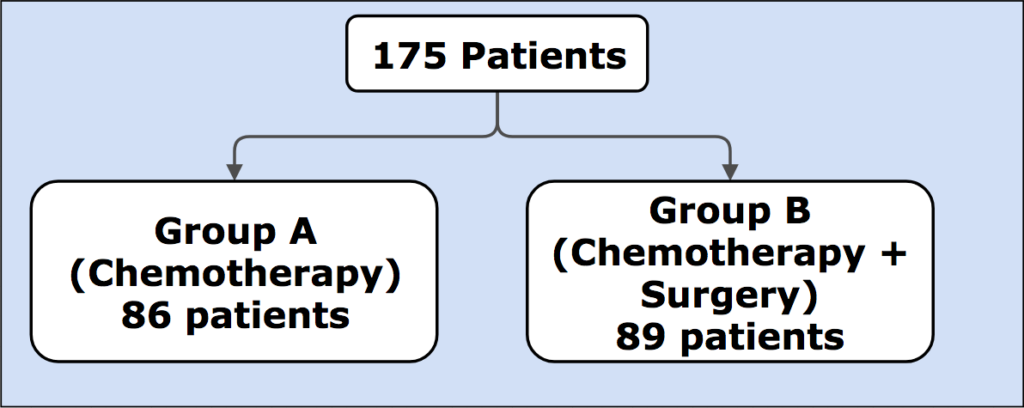Summary:
Advanced gastric cancer patients normally do not have surgery. The authors of this study wanted to know if a gastrectomy with chemotherapy would help patients with advanced gastric cancer. They found that the gastrectomy with chemotherapy was not helpful when compared to giving chemotherapy alone.
Link:
Where?
- Japan
When?
- 2016, The Lancet Oncology
Impact Factor (IF):
- 33.990
Sadly, many gastric cancer patients do not find out about their cancer until it is very advanced. Their disease is called “non-curable”. This means they cannot have a gastrectomy surgery to completely cut out the cancer. Normally, these patients only get chemotherapy to treat the disease. They will only have surgery (called a palliative resection or a bypass surgery) in an emergency situation.
The authors of this study wanted to see if having a gastrectomy surgery could help these advanced gastric cancer patients. They thought removing the source of cancer might decrease symptoms. Patients in the study had advanced gastric cancer; their disease had spread to lymph nodes far from the stomach.
 Chemotherapy: All patients were given the drugs S-1 and cisplatin for five weeks.
Chemotherapy: All patients were given the drugs S-1 and cisplatin for five weeks.
- S-1: a pill which stops cancer cells from dividing properly.
- Cisplatin (CDDP/CF): this drug stops cancer from making more cells.
Surgery: patients in Group B had a gastrectomy surgery. The surgery could have been a total, distal, or proximal gastrectomy. This describes what part of the stomach was cut out.
Results: The study found that adding surgery to chemotherapy was not helpful for patients with noncurative gastric cancer. The average overall survival was 14.3 months in Group B patients. The average survival in Group A was 16.6 months with just chemotherapy.
Group B patients who had surgery showed lower compliance. This means that they took less of the chemotherapy medicine they were told to take. This could have caused the shorter survival time in Group B. So, the researchers found that having a gastrectomy was not helpful in patients with advanced gastric cancer.
Related Reading:
- ncbi.nlm.nih.gov/pmc/articles/PMC2803175/ with clinicaltrials.gov/ct2/show/NCT00941655
- Kerkar, Sid P., et al. “The GYMSSA trial: a prospective randomized trial comparing gastrectomy, metastasectomy plus systemic therapy versus systemic therapy alone.” Trials 10.1 (2009): 121. Available from: 10.1186/1745-6215-10-121
The GYMSSA trial compares chemotherapy, to chemotherapy and surgery together. The participants were patients with advanced gastric cancer. The surgery removes both the stomach (gastrectomy) and other areas the cancer has spread to (metastasectomy).
Citation:
- Fujitani, Kazumasa, et al. “Gastrectomy plus chemotherapy versus chemotherapy alone for advanced gastric cancer with a single non-curable factor (REGATTA): a phase 3, randomised controlled trial.” The Lancet Oncology 17.3 (2016): 309-318. Available from: doi: https://doi.org/10.1016/S1470-2045(15)00553-7


